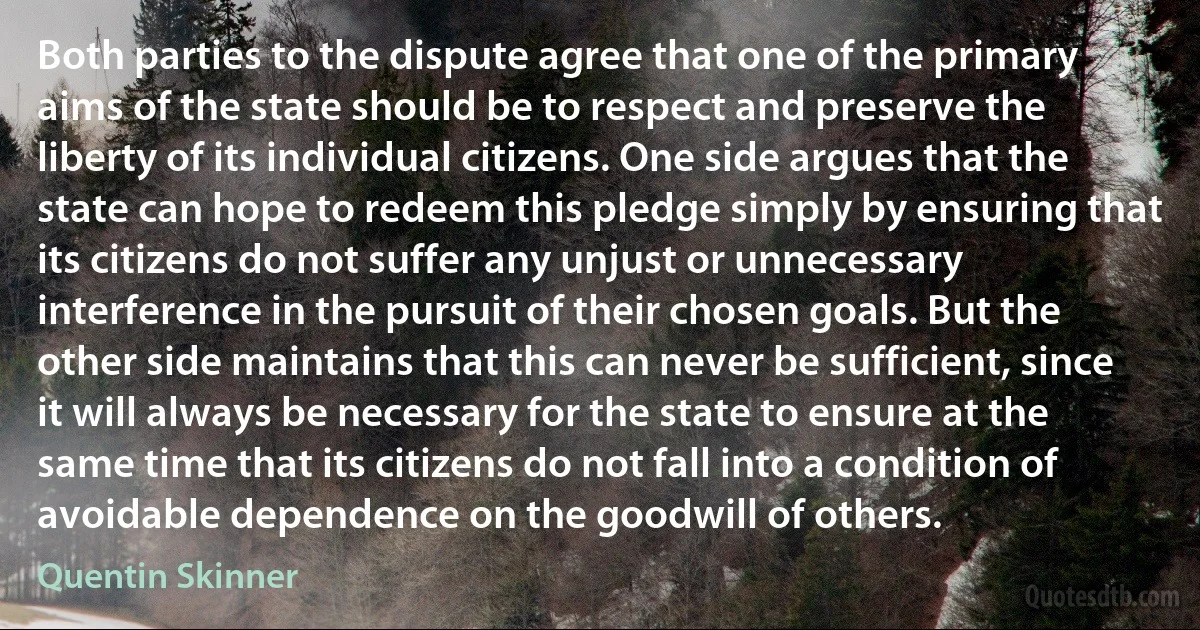
Both parties to the dispute agree that one of the primary aims of the state should be to respect and preserve the liberty of its individual citizens. One side argues that the state can hope to redeem this pledge simply by ensuring that its citizens do not suffer any unjust or unnecessary interference in the pursuit of their chosen goals. But the other side maintains that this can never be sufficient, since it will always be necessary for the state to ensure at the same time that its citizens do not fall into a condition of avoidable dependence on the goodwill of others.
Quentin SkinnerRelated topics
avoidable condition fall hope interference liberty necessary preserve primary respect should side state time othersRelated quotes
This [fourth] theory likewise implies contradictions and absurdities. The absurdities are these: The fact that some persons are born with defects, although they have not sinned previously, is ascribed to the wisdom of God, it being better for those persons to be in such a condition than to be in a normal state, though we do not see why it is better; and they do not suffer thereby any punishment at all, but, on the contrary, enjoy God's goodness. In a similar manner the slaughter of the pious is explained as being for them the source of an increase in reward in future life. They go even further in their absurdities.

Maimonides
Liberal philosophy, at this point, ceases to be empirical and British in order to become German and transcendental. Moral life, it now believes, is not the pursuit of liberty and happiness of all sorts by all sorts of different creatures; it is the development of a single spirit in all life through a series of necessary phases, each higher than the preceding one. No man, accordingly, can really or ultimately desire anything but what the best people desire. This is the principle of the higher snobbery; and in fact, all earnest liberals are higher snobs.

George Santayana
Every one of us knows how painful it is to be called by malicious names, to have his character undermined by false insinuations, to be overreached in a bargain, to be neglected by those who rise in life, to be thrust on one side by those who have stronger wills and stouter hearts. Every one knows, also, the pleasure of receiving a kind look, a warm greeting, a hand held out to help in distress, a difficulty solved, a higher hope revealed for this world or the next. By that pain and by that pleasure let us judge what we should do to others.

Arthur Penrhyn Stanley
It appears to general observation, that revolutions create genius and talents; but those events do no more than bring them forward. There is existing in man, a mass of sense lying in a dormant state, and which, unless something excites it to action, will descend with him, in that condition, to the grave. As it is to the advantage of society that the whole of its faculties should be employed, the construction of government ought to be such as to bring forward, by a quiet and regular operation, all that extent of capacity which never fails to appear in revolutions.

Thomas Paine
Individuals who have been wronged by unlawful racial discrimination should be made whole; but under our Constitution there can be no such thing as either a creditor or a debtor race. That concept is alien to the Constitution's focus upon the individual. ...To pursue the concept of racial entitlement - even for the most admirable and benign of purposes - is to reinforce and preserve for future mischief the way of thinking that produced race slavery, race privilege and race hatred. In the eyes of government, we are just one race here. It is American.

Antonin Scalia
